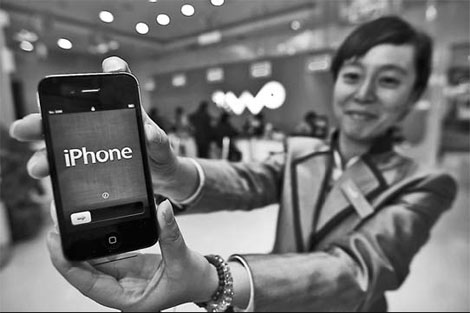Apple's share of Chinese smartphone market declines
Updated: 2012-02-18 07:37
By Lee Chyen Yee and Huang Yuntao (China Daily)
|
||||||||
|
A staff member at China Unicom's Wuxi branch in Jiangsu province displays the iPhone 4S. The number of mobile subscribers in China is set to top 1 billion this year. Huan Wei / Xinhua |
HONG KONG / BEIJING - Apple Inc's share of China's smartphone market slipped for a second straight quarter between October and December. The retreat came as the company lost ground to cheaper local brands and as some shoppers held back from purchases until after the launch of the iPhone 4S in January.
China, the world's largest mobile phone market, has not been an easy ride for Apple, which is grappling with a lawsuit from a local company over the iPad name and has issues concerning wages and working conditions at its supplier's factories.
With the number of mobile subscribers in China set to top 1 billion this year, there is cutthroat competition among Samsung Electronics Co Ltd, Nokia Oyj, Apple and the domestic companies Huawei Technologies Co Ltd and ZTE Corp.
While Apple regained its top spot as the world's largest smartphone vendor in the fourth quarter and in 2011 as a whole, it slipped to 5th place in China, overtaken by ZTE. Apple's smartphone market share in China slid to 7.5 percent from 10.4 percent in the three months between July and September.
In the last quarter, Samsung knocked Nokia off the top slot, taking 24.3 percent of the market, more than three times Apple's share, according to data from the researcher Gartner Inc. Nokia's market share more than halved last year, from more than 40 percent in the first quarter to less than one-fifth by the fourth quarter.
"Chinese handset makers have been actively promoting their smartphones with China's three telecoms operators, so we saw ZTE and Huawei gain significant market share," said the Taipei-based Gartner analyst C. K. Lu.
Gartner said this week that it expects the market share of Apple's iPhone to slip for a couple of quarters as the novelty of its latest 4S model wears off.
In the first quarter of last year, ZTE had a market share of just 3 percent, but ended 2011 ranked fourth with more than 11 percent.
Chinese companies are gradually shifting toward the higher end of the market, unveiling more feature-packed smartphones.
"If you want to sell handsets to the mass market, a simple rule of thumb in China is that the handset price has to be close to 70 percent of the monthly salary," said Jayesh Easwaramony, an analyst with Frost & Sullivan in Singapore.
"Today, an iPhone is more than two months salary."
This, said Easwaramony, provides an opportunity for the likes of Huawei and ZTE to cater to a mass market that is captivated by the iPhone, but doesn't have the purchasing power for it.
"The quality of Huawei's phones is quite high and good value for money compared with the iPhone," said Dale Dai, a 28-year-old sales executive from Beijing.
Dai, who uses his Huawei phone to write weibo, or Chinese micro blogs, surf the Internet and make calls, recently bought a new Honor smartphone for 1,800 yuan ($286), almost a third of the price of a new iPhone 4S which costs 4,988 yuan.
However, given the sheer size of the Chinese market, just targeting the highest-end users should be enough for Apple, though it's not always been a smooth ride.
Analysts expect Apple to stem its slide in market share in China by signing up another carrier.
China Unicom (Hong Kong) Ltd, the country's No 2 telecoms operator, is currently the only carrier to officially sell the iPhone. It has not officially announced its iPhone sales, but analysts estimate that the company has sold around 3 million since signing a contract with Apple in 2009.
China Telecom Corp Ltd, the third and smallest operator, is expected to be next to clinch a similar deal with Apple later this year, and analysts predicted it would sell about 1.4 million iPhones this year if it can reach a deal with Apple by May, rising to between 2 and 4 million new iPhone users in 2013.
Reuters

 Relief reaches isolated village
Relief reaches isolated village
 Rainfall poses new threats to quake-hit region
Rainfall poses new threats to quake-hit region
 Funerals begin for Boston bombing victims
Funerals begin for Boston bombing victims
 Quake takeaway from China's Air Force
Quake takeaway from China's Air Force
 Obama celebrates young inventors at science fair
Obama celebrates young inventors at science fair
 Earth Day marked around the world
Earth Day marked around the world
 Volunteer team helping students find sense of normalcy
Volunteer team helping students find sense of normalcy
 Ethnic groups quick to join rescue efforts
Ethnic groups quick to join rescue efforts
Most Viewed
Editor's Picks

|

|

|

|

|

|
Today's Top News
Health new priority for quake zone
Xi meets US top military officer
Japan's boats driven out of Diaoyu
China mulls online shopping legislation
Bird flu death toll rises to 22
Putin appoints new ambassador to China
Japanese ships blocked from Diaoyu Islands
Inspired by Guan, more Chinese pick up golf
US Weekly

|

|








